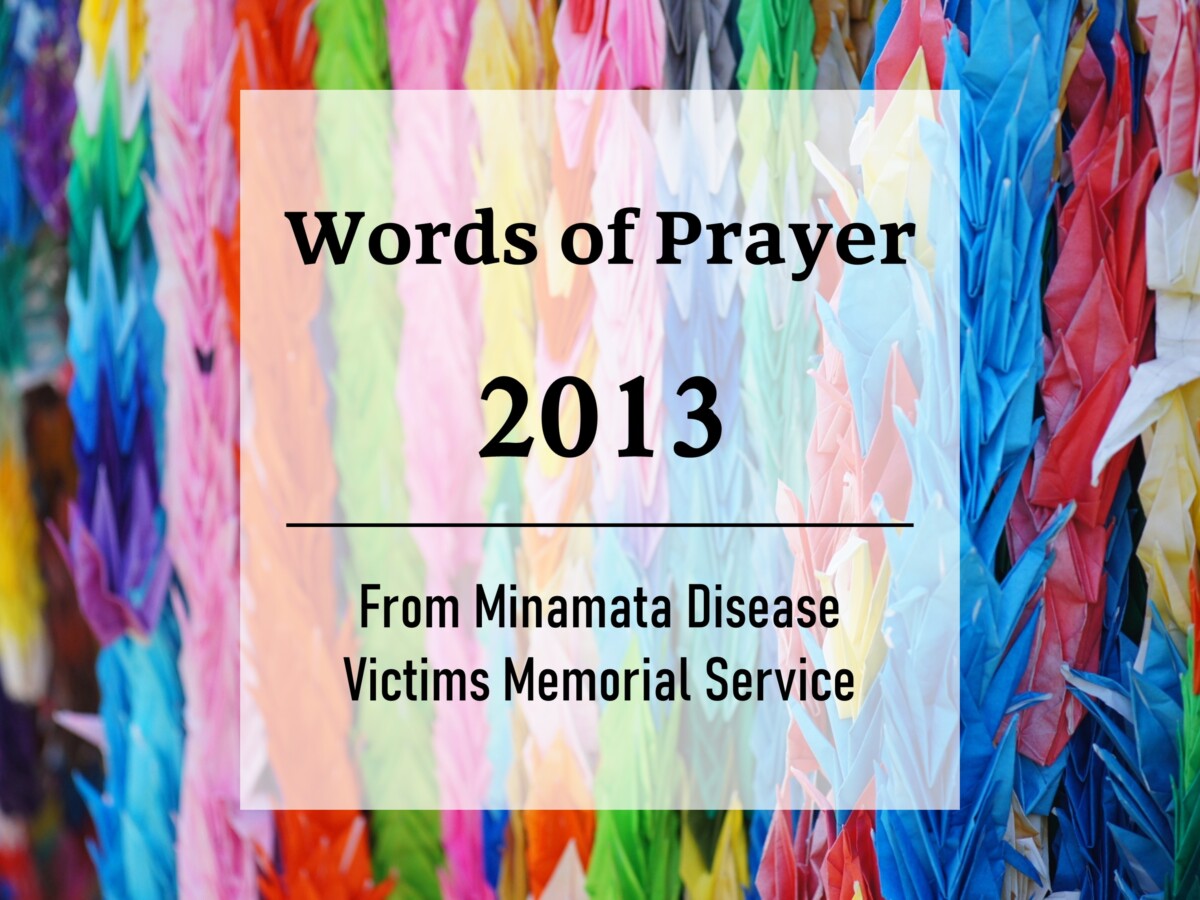
祈りの言葉2013年/金子 スミ子
水俣病患者・遺族代表 「祈りの言葉」
Minamata Disease Patient and Bereaved Family Representative’s “Words of Prayer”

ここに、患者・遺族代表として、祈りのことばを捧げます。
思い起こせば、結婚したのは、20歳の時でした。当時、夫は、運送会社に勤めていて、家の前がすぐ海だったので、出勤する前にいつも浜に行き、カニやカキをいっぱい取ってきてくれていました。そして、結婚して間もなく、長男がうまれました。その長男が2歳になる昭和28年4月に、よろめいて歩くことができなくなったので、いくつも病院を回りましたが、どうしようもありませんでした。ところが、1年後には、元気だった夫も発病してしまいました。そして、熊本大学病院に行くように勧められて、8月に行ったら、そのまま入院、大学の先生も原因がわからず、気休めのペニシリン注射ばかりでした。その頃生まれた次男は、私たちに話しかけることもなく、たった29日で亡くなりました。日晴れの準備もしていましたが、一度も袖をとおさなかった着物は、一緒にお棺の中に入れました。
As a representative of patients and bereaved families, I would like to offer my prayers.
I remember I was twenty years old when I got married. At that time, my husband was working for a shipping company. Since our house was right in front of the ocean, he used to go to the beach before going to work and pick up lots of crabs and oysters for me. Soon after the marriage, our first son was born. In April 1953, when our first son was two years old, he staggered and could not walk. We took him to several hospitals, but no doctor could find a cure. A year later, my husband, who had been in good health, also became ill. My husband and I were advised to go to Kumamoto University Hospital, and we went there in August. On the day we visited the hospital, my husband was immediately hospitalized. However, the doctors could not figure out the cause of the disease. All they did was give him penicillin injections just for a little comfort. Our second son, who was born around the same time, never spoke to us and passed away after only 29 days. We had prepared a kimono for him to wear for a shrine visit to pray for his future blessings. But he never had a chance to wear it and we put it in the coffin with him.
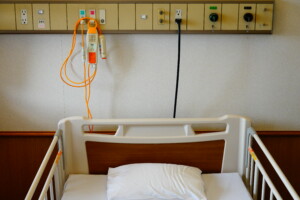 夫は、2ヶ月ぐらいで大学病院を退院しました。ところが、1年後、夫の容態が急に悪くなり、大学病院に入院しました。今度は、うまく話すこともできなくなり、一日一日症状はひどくなっていきました。けいれんして苦しむ夫を見ているのがとてもつらくて、涙が止まりませんでした。先生に「どうにかしてください。助けてください。」とお願いすると、先生も「治療は病院に任せてくれ。」と言われましたが、治療室には身内が入れないと聞いていたし、みんなから見られている夫もみじめだと思い、どうしても夫を大学病院に置いていくことができなくて、家に連れて帰りました。家に帰って2週間後でした。激しいけいれんがひっきりなしに夫をおそい、もがき苦しむ夫を、ばあちゃんが、もう最後だと思い抱きかかえた時、けいれんをしながら、ばあちゃんの胸で息を引き取りました。昭和30年5月でした。その時、私は妊娠7ヶ月でした。もう、子どもはあきらめようかと思いましたが、ばあちゃんに「せっかく授かった子どもだから、産まんね。」と励まされ、三男を産みました。三男は、百日たっても半年たっても一年たっても、首がすわりませんでした。どんな病気なのか心配していたら、後で胎児性水俣病と分かり驚きました。幼い子どもとばあちゃんとの生活はとても苦しくて、その日の暮らしがやっとでした。
夫は、2ヶ月ぐらいで大学病院を退院しました。ところが、1年後、夫の容態が急に悪くなり、大学病院に入院しました。今度は、うまく話すこともできなくなり、一日一日症状はひどくなっていきました。けいれんして苦しむ夫を見ているのがとてもつらくて、涙が止まりませんでした。先生に「どうにかしてください。助けてください。」とお願いすると、先生も「治療は病院に任せてくれ。」と言われましたが、治療室には身内が入れないと聞いていたし、みんなから見られている夫もみじめだと思い、どうしても夫を大学病院に置いていくことができなくて、家に連れて帰りました。家に帰って2週間後でした。激しいけいれんがひっきりなしに夫をおそい、もがき苦しむ夫を、ばあちゃんが、もう最後だと思い抱きかかえた時、けいれんをしながら、ばあちゃんの胸で息を引き取りました。昭和30年5月でした。その時、私は妊娠7ヶ月でした。もう、子どもはあきらめようかと思いましたが、ばあちゃんに「せっかく授かった子どもだから、産まんね。」と励まされ、三男を産みました。三男は、百日たっても半年たっても一年たっても、首がすわりませんでした。どんな病気なのか心配していたら、後で胎児性水俣病と分かり驚きました。幼い子どもとばあちゃんとの生活はとても苦しくて、その日の暮らしがやっとでした。
My husband left the university hospital in about two months. A year later, however, his condition suddenly worsened and he was hospitalized again. He was unable to speak properly, and he became worse day by day. It was so painful to see my husband suffering from convulsions that I could not stop crying. I said to the doctor, “Please do anything to help him”. Then the doctor said, “Don’t interfere the treatment. Let me handle it.” I heard that relatives were not allowed to stay in the room once the treatment began, and I also thought my husband would feel miserable being watched by everyone while he was struggling. Finally, I decided to take him home. I just couldn’t leave him there anymore. Two weeks later, violent cramps threatened my husband without interruption. My mother-in-law held her beloved son in her arms and my husband drew his last breath convulsively on her chest. It was May of 1955. I was seven months pregnant then. I thought about giving up having a child, but my mother-in-law encouraged me, “You’ve been blessed with a child, so give birth to it”. With her support, I gave birth to my third son. Even after a hundred days, half a year, or a year, my third son could not hold his head up. I was worried about what kind of disease he had, and to my surprise, it later turned out that he had fetal Minamata disease. It was very difficult for me to make a living with young children and an old mother. We were barely making ends meet.
三男が生まれて、うちの長男が入学前の頃だったと思います。家の上の道で、兄弟が遊んでいたそうです。そこへ原田先生が来て「うちはどこ?」って。兄弟が先生をうちに案内して、私に「兄弟二人とも水俣病ですね」って尋ねられ、私は「上の子は水俣病ですけど、下の子は違いますよ。」と言うと、「どうして?」とさらに尋ねられるので、「どうしてって、先生方がそう言ってるでしょ。下の子は魚を食べてないからって。私はそう思いません。私の食べた魚の水銀が、おなかの中にいたこの子に入ったに違いないとです。」って言ったそうです。このときが原田先生と胎児性患者の運命的な出会いとなったようです。原田先生が亡くなられる1週間前に最後のあいさつにいきました。原田先生は昨年お亡くなりになられるまで50年間ずっと水俣に通われて、三男をはじめ胎児性患者のよき相談相手になっていただきました。三男は、20代の頃ははまだ歩いていました。街に行って仲間のみんなとお酒を飲みにいったりしていました。しかし30代に入り、だんだんと歩くことができなくなりました。立つことができなくなり、話す言葉も聞き取りにくくなってきました。40代から車イス生活となっています。家にいるときは、お風呂に入るのも大変でしたが、今は毎日、胎児性患者の皆さんも通う「ほっとはうす」という施設に行ってますので、助かっています。
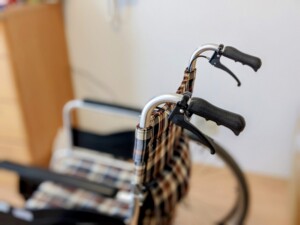 I think it was the time around my eldest son started school. My eldest and the third sons were playing on the street above our house. Then Dr. Harada came and asked them, “Where is your house?” My sons brought Dr. Harada to our house. The doctor said to me, “Both of your sons have Minamata disease, don’t they?” I said, “The older one has Minamata disease, but the younger one does not”. Then he asked me further, “Why?”. I said, “You ask me why? That’s because the doctors like you always tell me he doesn’t. They say my younger son doesn’t have Minamata disease because he didn’t eat the fish. But I don’t think they are right. The mercury from the fish I ate must have gotten into the baby through the stomach while he was in my tummy”. Dr. Harada says it was his first encounter with the fetal Minamata disease patient. One week before Dr. Harada passed away, I went to see him to pay my last respects to him. Dr. Harada had been coming to Minamata for 50 years until he passed away last year, and had been a good counselor for the fetal patients including my third son. My third son was still walking when he was in his twenties. He used to go to city center and have drinks with friends. However, as he entered his thirties, he gradually lost the ability to walk. He can’t stand up anymore, and it has been getting harder for him to have him heard. Since he entered his forties, he has been in a wheelchair. At home, it was very difficult for him to take a bath, but now he can with the help from the care facility called “Hotto House”, where he and other fetal patients go every day. It has been a great help to us.
I think it was the time around my eldest son started school. My eldest and the third sons were playing on the street above our house. Then Dr. Harada came and asked them, “Where is your house?” My sons brought Dr. Harada to our house. The doctor said to me, “Both of your sons have Minamata disease, don’t they?” I said, “The older one has Minamata disease, but the younger one does not”. Then he asked me further, “Why?”. I said, “You ask me why? That’s because the doctors like you always tell me he doesn’t. They say my younger son doesn’t have Minamata disease because he didn’t eat the fish. But I don’t think they are right. The mercury from the fish I ate must have gotten into the baby through the stomach while he was in my tummy”. Dr. Harada says it was his first encounter with the fetal Minamata disease patient. One week before Dr. Harada passed away, I went to see him to pay my last respects to him. Dr. Harada had been coming to Minamata for 50 years until he passed away last year, and had been a good counselor for the fetal patients including my third son. My third son was still walking when he was in his twenties. He used to go to city center and have drinks with friends. However, as he entered his thirties, he gradually lost the ability to walk. He can’t stand up anymore, and it has been getting harder for him to have him heard. Since he entered his forties, he has been in a wheelchair. At home, it was very difficult for him to take a bath, but now he can with the help from the care facility called “Hotto House”, where he and other fetal patients go every day. It has been a great help to us.

私も、もうすぐ82歳になります。毎日、子供たちのこれからが、とても心配です。皆さんのお力を借りなければやっていけません。三男は、仲間の人たちと一緒に、「ほっとはうす」で、訪問してくださる皆さんと交流するのを、楽しみにしています。みんなと一緒に学校とかに出かけることもあります。 私たち家族は、水俣病にふりまわされた日々でした。辛い思いもしましたが、精一杯生きてきました。亡き夫も遠くから見守ってくれていると思います。
I will soon become eighty two years old. Every day, I am very worried about the future of my children. It won’t do without the help from others. My third son, together with his friends, is looking forward to seeing the visitors at Hotto House. They often enjoy going out to school or other places. Our family’s lives have been greatly affected by Minamata disease for a long time. We had a hard time, but we lived our lives to the best of our ability. I think my deceased husband is watching over us from a distance.
私は世界中の女性に、私のような妻として母としての苦しみを、決して味わってもらいたくないと思い、水俣病資料館の語り部になりました。これからも体の許す限り語り続けてまいります。子どもたちが生きている限り、水俣病は終わりません。どうか最後の一人になっても忘れないでください。水俣病で亡くなられた多くの患者の皆さん、どうぞ安らかにお眠りください。
I became a storyteller at the Minamata Disease Museum because I did not want other women all over the world to suffer like I did. I will continue to tell my story as long as I am able to. As long as my son and other fetal Minamata disease patiets are alive, Minamata disease will never end. Please do not forget about Minamata disease and its patients even if there remains only one in the future. To the many patients who died of Minamata disease, please rest in peace.
平成25年5月1日
May 1, 2013
水俣病患者・遺族代表 金子 スミ子
Sumiko Kaneko,
Representative of Minamata Disease Patients and Bereaved Families
水俣病資料館ウェブサイトより
Reference Minamata City Minamata Disease Museum Website
翻訳 水俣インパクト translated by minamata impact
コメント ( 0 )
トラックバックは利用できません。











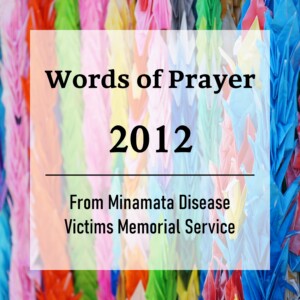

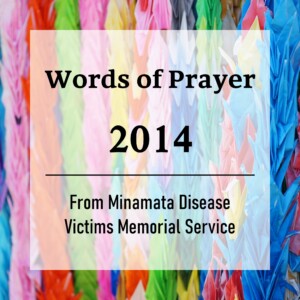
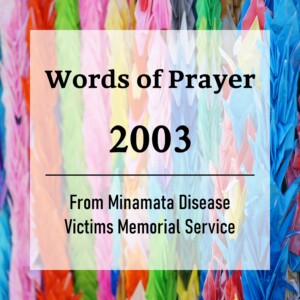
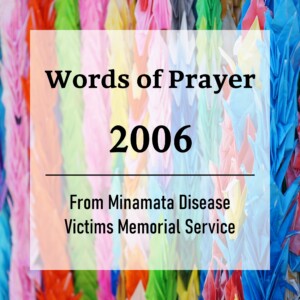
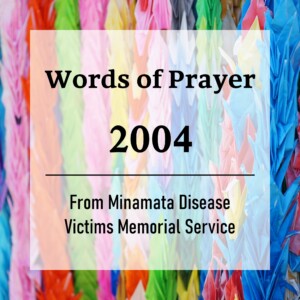
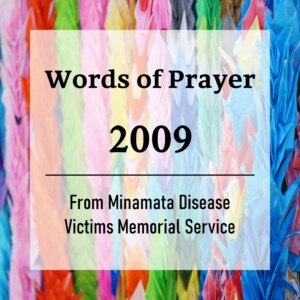
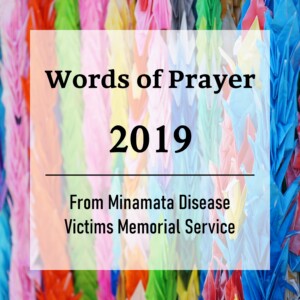
この記事へのコメントはありません。